Contents
Enterocolitis is one of the most common diseases of the gastrointestinal tract, in which both the small intestine (enteritis) and the large intestine (colitis) become inflamed at the same time. Enterocolitis can occur due to a wide range of intestinal infections (dysentery, salmonellosis, shigellosis), malnutrition, consumption of spicy and fatty foods, alcohol, prolonged use of antibiotics, food allergies, and so on.
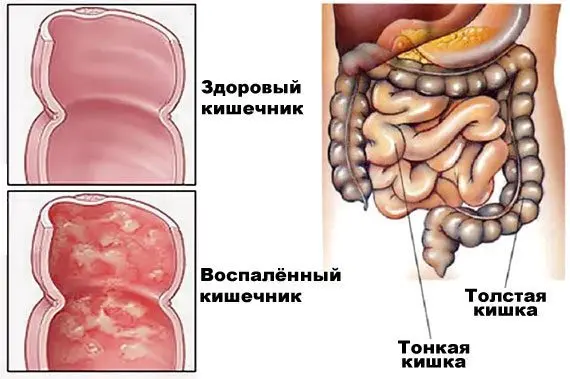
Depending on the course of the disease, enterocolitis is acute and chronic. Chronic enterocolitis can be a consequence of inadequately treated acute enterocolitis or other intestinal infection. During an exacerbation of the disease, a person feels pain in the abdomen, stool disorders, bloating, and flatulence appear.
What is enterocolitis?
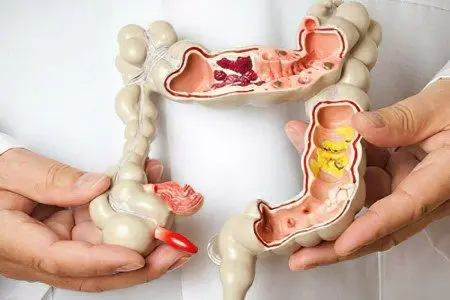
Enterocolitis is an inflammation of the small and large intestine. The human intestine has the appearance of a communicating tube, so there is no enteritis and colitis in an isolated form. Starting in one of the sections of the intestine, the inflammatory process inevitably spreads to another section. Limited colitis or enteritis can be observed only in the initial stages of the disease, but this does not affect the treatment, since the treatment process is always aimed at the treatment of enteritis as a whole.
This disease is one of the most common pathologies of the digestive system. It is especially common in children. Depending on which intestine is more affected, different forms of this disease are distinguished. Chronic enterocolitis is of a long-term nature and causes the appearance of atrophic changes in the intestinal mucosa, a violation of its functions.
The main varieties
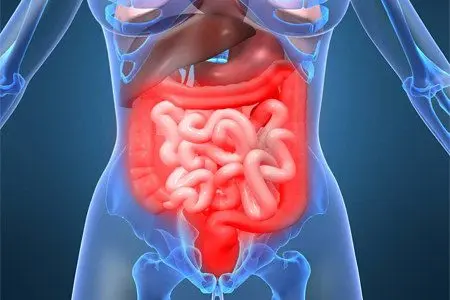
In its form, enterocolitis is divided into the following varieties:
Acute. This form of the disease is characterized by mucosal damage. Deep intestinal tissues are rarely affected. Acute enterocolitis often develops along with gastritis. It is infectious and non-infectious. In addition to infections, poisoning with poisons and drugs, as well as allergic reactions of the intestine, can lead to its development.
Chronic. The chronic form of the disease often develops against the background of an acute one in the absence of proper treatment. It is characterized by a long course, in which periods of exacerbation are replaced by systematic remissions with attenuation of symptoms. Chronic enterocolitis is characterized by damage not only to the intestinal mucosa, but also to its other tissues located more deeply. The chronic form can cause persistent malfunctions in the functioning of the intestines and the entire digestive system.
Depending on the cause of the disease, the following forms are distinguished:
Bacterial. In this case, the pathology is caused by a bacterial infection (staphylococcus, vibrio cholerae, shigella, salmonella, pathogenic strains of Escherichia, etc.) entering the body. Most often, an infectious lesion of the intestine occurs against the background of the development of diseases such as salmonellosis, shigellosis, dysentery and some others.
Parasitic. This form of the disease develops due to infection of the intestines with helminths, Trichomonas, Giardia, intestinal helminths or amoebic dysentery pathogens.
Alimentary. The reason for the development of this form of the disease is malnutrition.
Toxic. The development of toxic enterocolitis provokes poisoning of the body by certain drugs, aggressive chemicals and various poisons. Enterocolitis often develops as a result of taking antibiotics. A healthy person has a large number of bacteria in the intestines that help break down food and digest it. Taking antibiotics leads to the death of most beneficial bacteria and the creation of an ideal environment for the reproduction of pathogenic, pathogenic microorganisms that cause the development of the bacterial process.
Secondary. The secondary form of enterocolitis develops as a complication against the background of another past gastrointestinal disease, for example, cholecystitis, caused by a violation of the outflow of bile.
Mechanical. In this case, the disease is caused by injury to the intestinal mucosa by compacted feces during chronic constipation.
Allergic. In the allergic form of enterocolitis, there is a connection between the onset of symptoms of the disease and the consumption of certain foods – milk, mushrooms, nuts, vegetables, fruits, etc.
Necrotizing enterocolitis in infants
Infants and premature babies may develop necrotizing enterocolitis. In this case, inflammation in the mucous membranes is accompanied by the death of intestinal tissue. Symptoms of this pathology are diarrhea, bloody stools, vomiting, swollen and bloated abdomen, loss of appetite. There may also be signs of a bacterial infection (lethargy, shortness of breath, fever). The reasons for the development of the necrotic form of enterocolitis have not yet been fully elucidated.
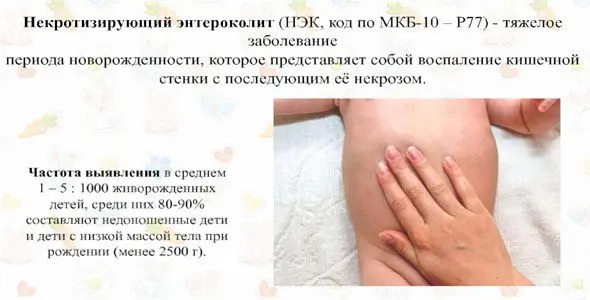
Doctors put forward the following theories of the development of this pathology:
the underdevelopment of the immune system of infants, which does not allow it to cope with bacterial attacks;
loss of oxygen or blood flow in the intestine leads to inflammation, which is subsequently exacerbated by a bacterial infection;
if the baby is overfed, there are too many bacteria in his intestines that the still underdeveloped digestive system cannot cope with.
Reasons for the development of enterocolitis
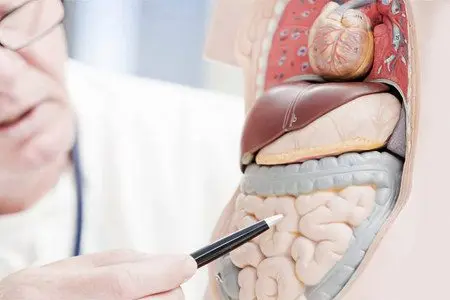
The most common causes of enterocolitis include past acute intestinal infections (salmonellosis, dysentery, typhoid fever, viral diarrhea), helminthiases (worms), diseases caused by malnutrition (malnutrition or overeating), food allergic reactions (due to taking antibiotics or other drugs) . Also, enterocolitis can develop due to congenital or acquired diseases of the stomach (gastritis), liver, pancreas (pancreatitis), problems with immunity and metabolism, dysbacteriosis and vitamin deficiency.
The disease develops when an infection damages the tissue cells of the digestive tract, leading to their subsequent depletion.
In children, enterocolitis is most often of a bacterial nature and develops as a result of non-compliance with the rules of hygiene by the child (eating unwashed fruits, licking dirty fingers) or employees of child care facilities (enterocolitis outbreaks periodically occur in kindergartens and schools caused by a violation of cooking technology).
Also, the development of enterocolitis can be caused by other causes that disrupt the functioning of the intestine. For example, the appearance of congestion inside the intestines, the development of constipation and enterocolitis can lead to regular consumption of refined foods.
The disease can also be caused by toxic causes, for example, its appearance can provoke drug poisoning. Enterocolitis often develops against the background of uncontrolled medication without a doctor’s appointment or an apparent reason. Getting into the body in large quantities, drugs not only cause damage to the intestinal mucosa and its thinning, but also impair the functioning of the immune system.
Enterocolitis affects some people working in hazardous industries. In this case, the disease is caused by constant contact with unhealthy, poisonous chemicals.
Often the disease develops due to improper, rational nutrition. As experience shows, people who are fond of spicy, fatty, oversalted foods and abuse foods with a high content of coarse fiber are more likely to get sick with it.
Enterocolitis can also develop in the form of chronic intestinal obstruction, accompanied by regularly recurring constipation, scarring of the intestinal tissue, and the formation of tumors.
Sometimes the cause of the development of enterocolitis is allergic reactions due to individual intolerance to a particular food product. Thrombosis or an injury to the abdomen can also cause the disease.
The following factors can also provoke the development of enterocolitis:
chewing apparatus defects;
hasty food;
diseases of the biliary tract and liver;
secretory insufficiency of the stomach and pancreas.
[Video] Enterocolitis, Colitis and Enteritis of the Intestine. Causes and symptoms:









